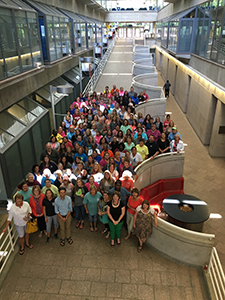
From July 11 to July 21, 151 kindergarten through fourth grade teachers from around Arkansas spent their days on campus learning new approaches to teach science. The teachers were participating in the U of A Science and Engineering Partnership, or UASEP.
The program, which was created by the College of Engineering and is funded by a $1.7 million three-year grant from the Arkansas Department of Education, helps prepare public school teachers to implement the new Arkansas K-4 Science Standards. UASEP focuses on helping teachers understand the new standards and develop new, inquiry-based approaches to teaching in the STEM areas. Because the new standards emphasize the cross-cutting nature of science and engineering, UASEP will also help teachers increase their content knowledge and add more literary and writing skills into their classrooms.
"Science instruction in K-4 has historically been limited due to a lack of content knowledge and confidence in teaching science. It is exciting to see teachers begin the program with hesitation and fear of teaching the new science standards and by the end of the workshop, leave with excitement and lesson plans to deliver to their students," explained Bryan Hill, the primary investigator and assistant dean in the College of Engineering.
 |
|
More than 150 kindergarten through fourth grade teachers spent two weeks on campus in July learning new approaches to teaching science. |
This year's group was the first to participate in the project, and they came from schools in northwest, east, west and southeast Arkansas. Caitlin Adams, a kindergartener teacher from Rogers, explained that she is excited about the new standards, because it will give her students more chances to explore scientific ideas.
"A lot of our science before [the new standards] was listing or just identifying," she explained. While her school has always incorporated hands-on projects, Adams explained that with the new standards, this type of learning will be the focus of her class. "Instead of just labelling a plant, we're going to be asking questions like, why do plants need light? What does light do for us?" She is confident that her students will benefit from this new approach, because she can see that, even at the kindergarten level, students are excited to interact with scientific concepts. "A lot of people don't think that kindergarteners can do real science," she said, "My students know they're scientists."
Adams explained that the UASEP program has given her plenty of resources to start creating these experiences for her students in the fall. "My favorite things about the program are the tools that they are equipping us with. We get to try different activities that we can modify and take into our classrooms. And we're really learning the background of the science," she said.
Adams explained that, because the participants work in groups that include teachers of different grade levels, she will also be able to pass along ideas and lesson plans for her colleagues who teach other grades. She also explained that working with the university gives her confidence that she will be able to provide her students with the skills and knowledge they will need for college and careers in the future. "This is a great opportunity for any educator that wants to learn more about the standards," she said.
The UASEP team includes U of A faculty from the College of Engineering, Honors College, and UAteach, an elementary science specialist at Rogers and Springdale Public Schools, math and science specialists at Northwest Arkansas Educational Service Cooperative, and an evaluator from the U of A College of Education and Health Professions.
Contacts
Camilla Shumaker, director of communications
College of Engineering
479-575-5697,